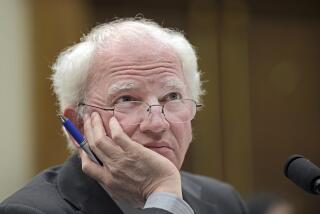Reno Applied the Law, Not Politics
- Share via
If Atty. Gen. Janet Reno had called for an independent counsel to investigate President Clinton and Vice President Al Gore for the 1996 campaign abuses, she could have washed her hands of the whole mess.
Instantly, she would have put herself on the same page as FBI Director Louis Freeh and won loud plaudits from Republicans in Congress as an independent-minded hero. And President Clinton couldn’t have touched her.
She did things differently. In the long run, the political and legal systems are better off for it.
This is not the end of the investigation of Clinton, though it does take much pressure off Gore. “Any decision not to ask for an independent counsel does not mean that a person has been exonerated,” she said, “or that the work of the campaign finance task force has ended.”
This decision was sealed weeks ago when Reno decided to focus on whether fund-raising phone calls made from the White House violated a 100-year-old law. There was no precedent for such prosecutions.
Republicans quickly attacked her for the narrowness of her ruling. But as Sen. Carl Levin (D-Mich.) noted, some of the same Republicans had once insisted that the phone calls were not a narrow issue but a big deal that needed investigating, which Reno did. “They’re shifting the goal posts just to keep the pot boiling,” Levin said.
Unfortunately for the Democrats, there’s more to the story. Clinton’s 1995-96 ad campaign, paid for with unregulated “soft money,” has come under legitimate attack, and not just from Republicans. The ads certainly violated the spirit of the reform laws passed after Watergate, which provide taxpayer money to presidential candidates who agree to limit their spending. A strong case can be made that Clinton’s involvement in planning the ad campaign violated the letter of the law, too.
Clinton believes he found a loophole in the law that let him run the ads because they focused on “issues” and because they never said “vote for Clinton.” Even if a court were to rule in Clinton’s favor, his choice was dead wrong and profoundly damaging to the political system.
It’s far from clear that it’s the job of an independent counsel to settle such legal arguments. And any investigation of Clinton would have to look into comparable Republican campaign abuses.
Freeh’s break with Reno is a much bigger problem for Clinton. Freeh has a different view of the case and the law. He thinks there may be two conspiracies, one within the Clinton administration and one by the Chinese government to influence our election. The possibility of a conspiracy tips him toward a counsel. And he worries that Reno’s Justice Department has an inherent conflict of interest investigating the president.
Freeh’s view may yet carry the day. But Reno’s decision leaves time for that. Her judgment is that sticking another independent counsel on the president is a decision not to be taken lightly--or in response to pressure. She’s right, especially given the performance of recent counsels and the Republican leanings of the judicial panel that would select this one. Justice is not disserved by her insistence that the case needs to develop further.
In the meantime, Freeh and Reno should air their grounds for disagreement as publicly as they can. It’s too late, with all the leaks, to say this is an internal matter.
This dreary mess leaves the campaign laws in tatters. That, in large part, is Clinton’s fault. The independent counsel statute is more hopelessly mired in partisan politics than ever. The Republicans have much to do with that. So much for the Watergate reforms. Reno keeps trying to preserve a precarious balance. Don’t envy her. It will only get harder.
More to Read
Get the L.A. Times Politics newsletter
Deeply reported insights into legislation, politics and policy from Sacramento, Washington and beyond. In your inbox twice per week.
You may occasionally receive promotional content from the Los Angeles Times.










